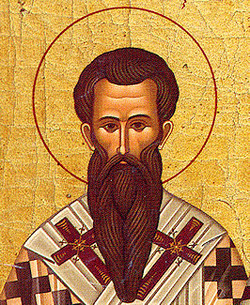
Basil ranks among the greatest figures in church history and the rather extravagant panegyric by Gregory of Nazianzus has been all but equalled by a host of other eulogists. Physically delicate and occupying his exalted position but a few years, Basil did magnificent and enduring work in an age of more violent world convulsions than Christianity has since experienced. (Cf. Newman, The Church of the Fathers). By personal virtue he attained distinction in an age of saints; and his purity, his monastic fervour, his stern simplicity, his friendship for the poor became traditional in the history of Christian asceticism. In fact, the impress of his genius was stamped indelibly on the Oriental conception of religious life. In his hands the great metropolitan see of Caesarea took shape as the sort of model of the Christian diocese; there was hardly any detail of episcopal activity in which he failed to mark out guiding lines and to give splendid example. Not the least of his glories is the fact that toward the officials of the State he maintained that fearless dignity and independence which later history has shown to be an indispensable condition of healthy life in the Catholic episcopate.
Some difficulty has arisen out of the correspondence of St. Basil with the Roman See. That he was in communion with the Western bishops and that he wrote repeatedly to Rome asking that steps be taken to assist the Eastern Church in her struggle with schismatics and heretics is undoubted; but the disappointing result of his appeals drew from him certain words which require explanation. Evidently he was deeply chagrined that Pope Damasus on the one hand hesitated to condemn Marcellus and the Eustathians, and on the other preferred Paulinus to Meletius in whose right to the See of Antioch St. Basil most firmly believed. At the best it must be admitted that St. Basil criticized the pope freely in a private letter to Eusebius of Samosata (Ep. ccxxxix) and that he was indignant as well as hurt at the failure of his attempt to obtain help from the West. Later on, however, he must have recognized that in some respects he had been hasty; in any event, his strong emphasis of the influence which the Roman See could exercise over the Eastern bishops, and his abstaining from a charge of anything like usurpation are great facts that stand out obviously in the story of the disagreement. With regard to the question of his association with the Semi-Arians, Philostorgius speaks of him as championing the Semi-Arian cause, and Newman says he seems unavoidably to have Arianized the first thirty years of his life. The explanation of this, as well as of the disagreement with the Holy See, must be sought in a careful study of the times, with due reference to the unsettled and changeable condition of theological distinctions, the lack of anything like a final pronouncement by the Church's defining power, the "lingering imperfections of the Saints" (Newman), the substantial orthodoxy of many of the so-called Semi-Arians, and above all the great plan which Basil was steadily pursuing of effecting unity in a disturbed and divided Christendom.
St Basil is included in the 33 Doctors of the Church Book below




